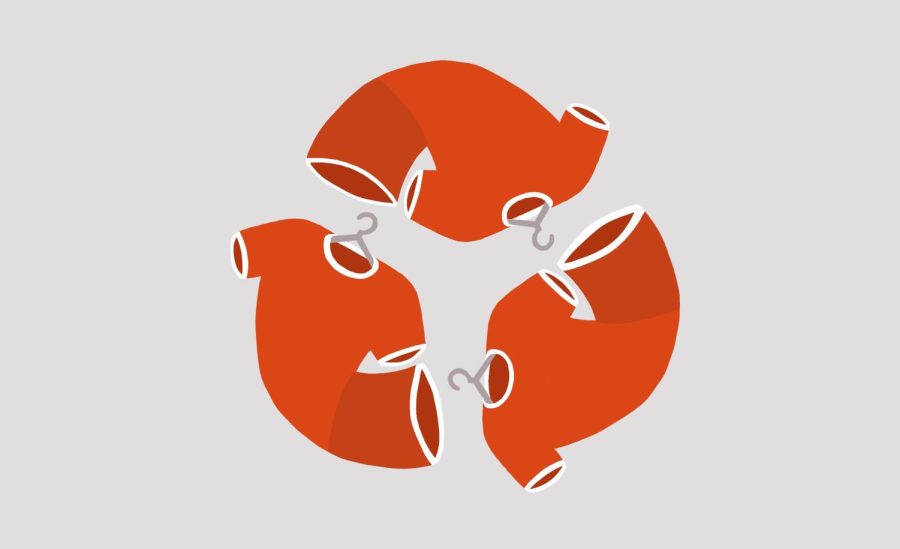Consider the cost
Recycling clothes and shopping sustainably are both ways to buy clothing without contributing to fast fashion.
February 15, 2022
Popular brands like Shein, Forever 21, Nike, H&M, Urban Outfitters, Zaful and others are all contributors to the fast fashion industry. The term “fast fashion” is defined by the Oxford dictionary as “inexpensive clothing produced rapidly by mass-market retailers in response to the latest trends.” Fast fashion comes into play when looking at labor laws and environmental safety.
Many fast fashion brands, such as Urban Outfitters and Shein, have been accused of underpaying their staff and enforcing unsafe working conditions. For example, Shein, based in China, has allegedly implemented child labor and has not disclosed any information about their working conditions.
Companies like Shein put their factories in countries like Bangladesh, Indonesia or China. These countries have very loose labor laws, allowing them to exploit loopholes for cheaper labor and more workers, some of which are children. An example of this in China is the child labor law that states the prohibition of child labor under sixteen. Under certain circumstances, like if the occupational training or educational labor does not affect the child’s personal health and safety, it may be allowed.
Most of these factories will also use synthetic fabrics such as polyester, spandex or nylon. These materials are made from nonrenewable fossil fuels such as oil and natural gasses, which is a waste of resources that we can not easily produce. The use of fossil fuels releases large amounts of carbon dioxide into the air, which traps heat in the atmosphere and, in turn, contributes to global warming.
According to The International Bank for Reconstruction and Development (IBRD) and the International Development Association (IDA), the fashion industry contributes to more than ten percent of the greenhouse gas emissions in the world. At this pace, that number will increase to 50 percent by the year 2030.
According to a New York Times article, “How fast fashion is destroying the planet,” about 85 percent of textile waste from unwanted clothes goes into landfills. These fast fashion brands are following the rapidly changing trends in the apparel industry and, in turn, creating extreme amounts of waste through thrown-away clothes. Because of these microtrends, which influence what is and is not considered “cool,” there is an ongoing pollution problem. Fast fashion is a fast-growing problem for both the environment and for the safety of workers in the industry.
Shopping sustainably is not always easy; when companies pay their workers properly and practice environmental safety, it is more expensive. Sometimes sustainable fashion is not available to everyone, and that is OK. The goal is to shop as sustainably as possible when you have the opportunity to. Alternatives to fast fashion include thrift stores, small businesses and environmentally friendly brands.
Brands like Patagonia, Pact and Levi’s are all places to buy sustainable clothing. Depop is an online brand similar to thrifting in that you can both buy and sell clothing from other people across the globe. Clothing can and should be reused. Contributing to waste is needless when resellers like Depop and thrift stores such as Goodwill, City Thrift and Salvation Army exist. According to the California Public Interest Research Group, 81 pounds of clothing is thrown away globally each year; do you want to contribute to that?
If a brand has a large variety of styles, is quick to produce items within the current trend or if they seem to copy other popular brands, they might be unsustainable. Another great option you can use to find out if a brand contributes to fast fashion is to use the app “Good On You,” where you can look at different brands’ sustainability and price range.
Shopping using these options supports companies who are clean and treat their workers fairly. Next time you buy your clothes, consider the cost fast fashion has on the environment and those who work for these companies.





Alexandra Clair • Mar 14, 2022 at 1:36 pm
This is an excellent article by a young person very connected while practicing critical thinking skills.